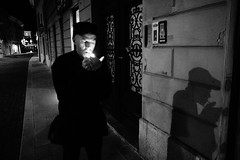 Several years ago, I read an article about tragedy. Although the author and exact place of its publishing escape me, I remember its main thrust: The literary form that secured a place in the history books for Sophocles and Shakespeare is so dour and downbeat that it may never find a foothold in America's optimistic storytelling tradition. That claim certainly has merit, at least on a popular level. One only needs a passing knowledge of big blockbuster movies to see that most American films prefer everything to be sunny and upbeat. But if tragedy can't find a place to lay its head in the land of the free, it may find a home Down Under if Australian director Nash Edgerton's black-as-tar noir The Square is any indication.
Several years ago, I read an article about tragedy. Although the author and exact place of its publishing escape me, I remember its main thrust: The literary form that secured a place in the history books for Sophocles and Shakespeare is so dour and downbeat that it may never find a foothold in America's optimistic storytelling tradition. That claim certainly has merit, at least on a popular level. One only needs a passing knowledge of big blockbuster movies to see that most American films prefer everything to be sunny and upbeat. But if tragedy can't find a place to lay its head in the land of the free, it may find a home Down Under if Australian director Nash Edgerton's black-as-tar noir The Square is any indication.Ray Yale doesn't always choose the straight path. A contractor charged with overseeing the construction of a resort, he isn't immune to taking the odd kickback and cooking the books to hide it. But he has his reasons, mostly relating to an ongoing affair with the comely Carla, the wife of a petty thug. See, Carla wants Ray to run away with her, but that takes money, and Ray doesn't have any. Then one day Carla makes a discovery -- a bag of cash secreted away in the attic. They could just take it, pack up the car and leave. No, Ray says, then people would know, and the only way to make a scheme like that work would be to, oh, I dunno, burn down the house so it looks like the cash just went poof. Not that Ray really wants to do that. He's just thinking out loud. Only Carla starts saying he doesn't care, isn't serious about their relationship. So Ray makes a phone call to a certain firebug. And that's when everything begins to go wrong ...
Detectives Beyond Borders' Peter Rozovsky argues that noir protagonists always go willingly to their doom, and while I might quibble a bit with his definition, I find it essentially sound. You won't find happy endings in noir, and the inevitability of catastrophe hangs over The Square like Damocles' famous sword. Cell phones fail at crucial moments, misunderstandings turn bloody, and innocent (and not-so-innocent) people begin to die in truly horrible ways. But the protagonists' moral culpability differentiates the film from other noir pieces wherein an existentially bleak world breaks its inhabitants without rhyme or reason. 'If you listen closely ..., you might hear the devil chuckling in the background as the characters continually dig themselves into more hopeless predicaments," writes Dan Lybarger of eFilmCritic.com. The tragic final moments hit like a bullet to the brain, reminding us that our sins really will find us out.
(Picture: CC 2011 by i k o)


No comments:
Post a Comment